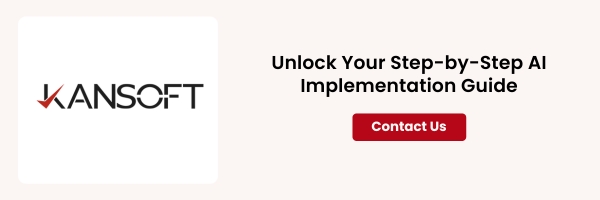Artificial Intelligence has become the headline act in every boardroom discussion. From generative AI to predictive analytics, companies are racing to explore AI’s potential. Yet, most AI initiatives stall at the pilot stage. Why?
The answer: they lack a structured, scalable AI implementation roadmap.
This blog breaks down what a successful roadmap looks like—so you can move from hype to impact and start delivering real business value.
Why You Need an AI Implementation Roadmap, Not Just a Proof of Concept
Many organizations start their AI journey with excitement but little direction. Teams launch pilots without long-term vision, or they adopt tools because “everyone else is doing it.”
A clear AI implementation roadmap aligns business needs with technical feasibility and keeps your teams focused on delivering outcomes—not just experiments.
It answers questions like:
- What are we solving with AI?
- What data do we need?
- Who owns implementation?
- How will we scale?
Step 1 – Define Clear Business Goals for AI Implementation
Before diving into tools or technology, start by clarifying what success means for your organization. Consider questions like:
- What’s the pain point—manual workflows, slow decision-making, high error rates?
- What KPIs will we track?
- How will AI improve the process?
Whether it’s reducing fraud, enhancing patient outcomes, or automating customer support, make sure the use case is tied to measurable value.
This is the foundation of every effective AI implementation roadmap.
Step 2 – Assess Data Readiness and Integration Capabilities
AI is only as effective as the quality of the data behind it. Unfortunately, most enterprises deal with fragmented data silos, inconsistent formats, or compliance constraints.
Here’s what to assess:
- Are your data sources accessible and unified?
- Is the data structured and labeled?
- Are privacy and security policies in place?
A strong roadmap includes a data governance strategy, integration pipelines, and data quality audits—long before model training begins.
Step 3 – Select the Right Use Cases for Scalable Implementation
Not every process needs AI—and not every AI solution needs deep learning.
Start with high-impact, low-complexity use cases to build internal trust and momentum. Examples might include:
- Automating invoice classification
- Predictive maintenance alerts
- Medical report summarization using GenAI
Your AI implementation roadmap should include a phased rollout strategy that evolves from low-risk pilots to enterprise-wide deployments.
Step 4 – Design for Scale: From Prototype to Production
One of the biggest reasons AI initiatives fail is the “prototype trap.” The model works in isolation but fails in production due to performance, integration, or security gaps.
To avoid this:
- Use cloud-native architecture for agility
- Leverage MLOps for lifecycle management
- Monitor models with real-time dashboards
- Design feedback loops to continuously improve accuracy
Make scalability a built-in component of your AI roadmap, not an afterthought.
Step 5 – Integrate Ethical AI Practices and Strong Governance
AI decisions impact real people—so ethics, transparency, and fairness can’t be optional.
A successful AI implementation roadmap includes:
- Bias detection and mitigation
- Model explainability
- Access controls and auditability
- Compliance alignment (e.g., HIPAA, GDPR)
This is particularly vital in sectors like healthcare, finance, and government, where maintaining trust is absolutely essential.
Step 6 – Train Teams and Promote Cross-Functional Collaboration
AI projects aren’t just for data scientists. Your roadmap should involve:
- Domain experts who understand business logic
- IT teams for infrastructure and deployment
- End-users for feedback and adoption
- Legal/compliance stakeholders
The more collaborative your implementation, the more sustainable and scalable your solution becomes.
Real-World Impact: Kansoft’s Approach to AI Implementation
At Kansoft, we help organizations move from ideas to impact through tailored AI implementation roadmaps. Our clients often approach us with questions such as:
- “How do we scale this pilot to 5 regions?”
- “How can we build an AI workflow that integrates with our existing ERP?”
- “Can GenAI safely summarize patient data in real-time?”
We answer these not with one-off models—but with:
- AI consulting services
- Scalable deployment plans
- Custom model development
- Data integration pipelines
- Ongoing MLOps and support
With Kansoft, you’re not just building AI—you’re building AI that works and scales.



